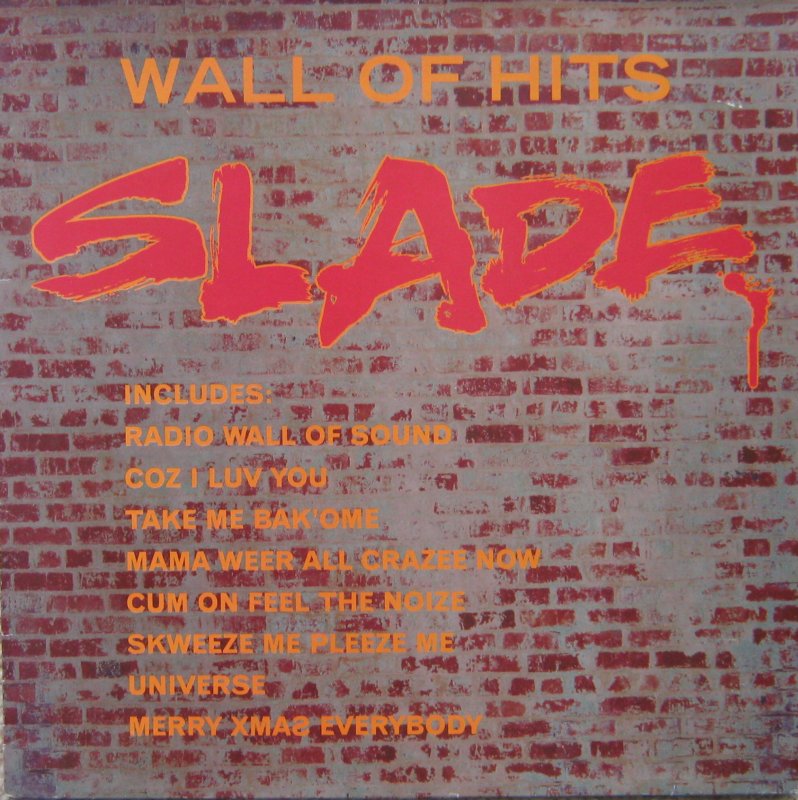The early 70s were a grim time here in the UK. Vast unemployment, the three day week, civil unrest, four day guitar solos. The much needed antidote to this misery was the playful escapism that was glam rock, which consisted of largely simple rock and roll tunes with a defined commercial edge, ridiculous stage costumes and created with a sense of fun. The likes of David Bowie and Queen piggy-backed on the glam rock to their own ends on their way to being seen as ‘serious’ album artists, but on the whole it was largely a singles concern. There were other exceptions though, T. Rex straddled the singles and album charts for a short while, as did Mott the Hoople to a lesser extent. The undisputed kings of glam rock though were Slade, who had neither the pretty-boy good looks of Marc Bolan, nor the song-writing assistance required by the likes of Sweet and Suzi Quatro. Slade were a fully functioning autonomous unit, who wrote their own songs, had a refreshing lack of sophistication about them and enjoyed unparalleled commercial success in the singles chart. More than any other band, in the early 70s Top of the Pops was ruled by Slade, and Wall of Hits is a monument to that.
Slade’s songs were deceptively simple, built around big hard-rocking riffs, bigger singalong choruses and the song writing team of bass player Jim Lea and lead vocalist Noddy Holder, whose throaty rasp did much to push Slade so far ahead of the pursuing pack. Basic though their tunes were, Slade new exactly what buttons to press in terms of producing a string of brilliant singles.
Much of Slade’s strength lay in the fact that, where the majority of commercial successful glam rock acts were studio specialists, Slade, along with the likes of the aforementioned Mott The Hoople, were an awesome live band, and their three and four minute wonders brought down the house every night. Slade never lost sight of the fact that their comparative longevity as a singles act was down to the fact that they could pack in the crowds every night and they prided themselves on being consummate entertainers.
Basic though the songwriting is, it is strangely resilient. A song like “Cum On Feel The Noize” sounds equally strong as a screamalong rocker, or an acoustic lament (as demonstrated by Holder in the late 90s). That doesn’t mean that just any idiot could emulate the Slade magic though, as Quiet Riot’s attempts at covering Slade tunes demonstrated. The less said about Oasis’s rancid attempt at “Cum On Feel The Noize” the better, though at least it put to bed the frankly offensive notion that the Gallagher brothers were the 90s Slade.
Things change though, and towards the mid 70s Slade realised that they had to mature to establishing a lasting career. To everyone’s surprise (perhaps even their own) they did this rather well, as slower piano-based numbers like “Everyday” and “How Does It Feel” demonstrated that there was a lot more to Slade than rollicking guitar numbers and that they could do tender when they put their minds to it. Inevitably though there was a decline in Slade’s commercial success and with the onslaught of Punk they reverted to being just a brilliant live act, something which they underlined when they were hailed as the best act at the 1980 Reading Festival. As they were embraced by heavy metal fans, Slade enjoyed a minor commercial come back, but singles like “My Oh My” and “Run Run Away” just weren’t as good as the band’s previous hits. A couple of Jim Lea penned tracks in the early 90s heralded this splendid compilation, but other than that Slade just fizzled out. Holder and Lea quit the band while Don Powell and Dave Hill recruited a couple of nobodys, called themselves Slade 2 and headed towards nostalgia-circuit hell. It was a sadly depressing end to what had been a joyous and uplifting band.
It’s far too easy to see Slade as a hideously unfashionable act from a music genre that taste forgot, but that’s doing them a great disservice. For a while Slade were undoubtedly the biggest band in Britain, a truly talented crowd-pleasing rock band that released a string of great singles that brought joy to the masses. Other glam rock acts may be more fashionable to enjoy now, but none of them were better than Slade in their prime.














No Comment